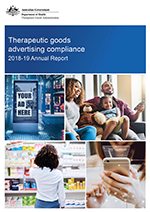
As part of the Australian Commonwealth Department of Health, the Therapeutic Goods Administration (TGA) contributes to the protection and promotion of public health through the regulation of therapeutic goods advertising. On 1 July 2018, the TGA became the single body for handling complaints about the advertising of therapeutic goods in Australia. This is the inaugural report on the TGA's complaint handling activity.
Because therapeutic goods are intended to effect and influence the health and wellbeing of those who use them, these goods are subject to special advertising requirements beyond those required for other consumer goods. People who seek information about therapeutic goods are often facing health concerns, including serious diseases or conditions, and may be vulnerable to advertising claims. It is vital that consumers have accurate information about the products and treatments available as misleading information could affect their health outcomes. The advertising requirements are specified in the Therapeutic Goods Act 1989 and the Therapeutic Goods Advertising Code.
During the 2018-19 financial year, the TGA received 1468 complaints about the advertising of therapeutic goods. This report provides an overview of the sources of those complaints and the way that the complaints were categorised and handled, including the most common breaches and the priority given to cases that pose the highest risk to consumer health and safety. The report uses case studies to illustrate the types of advertising breaches identified and the actions taken by the TGA to remove non-compliant advertising.
The information in this report will assist advertisers and other stakeholders to understand the way we prioritise our work and focus our resources to most effectively contribute to the TGA's mandate to protect public health and safety.

